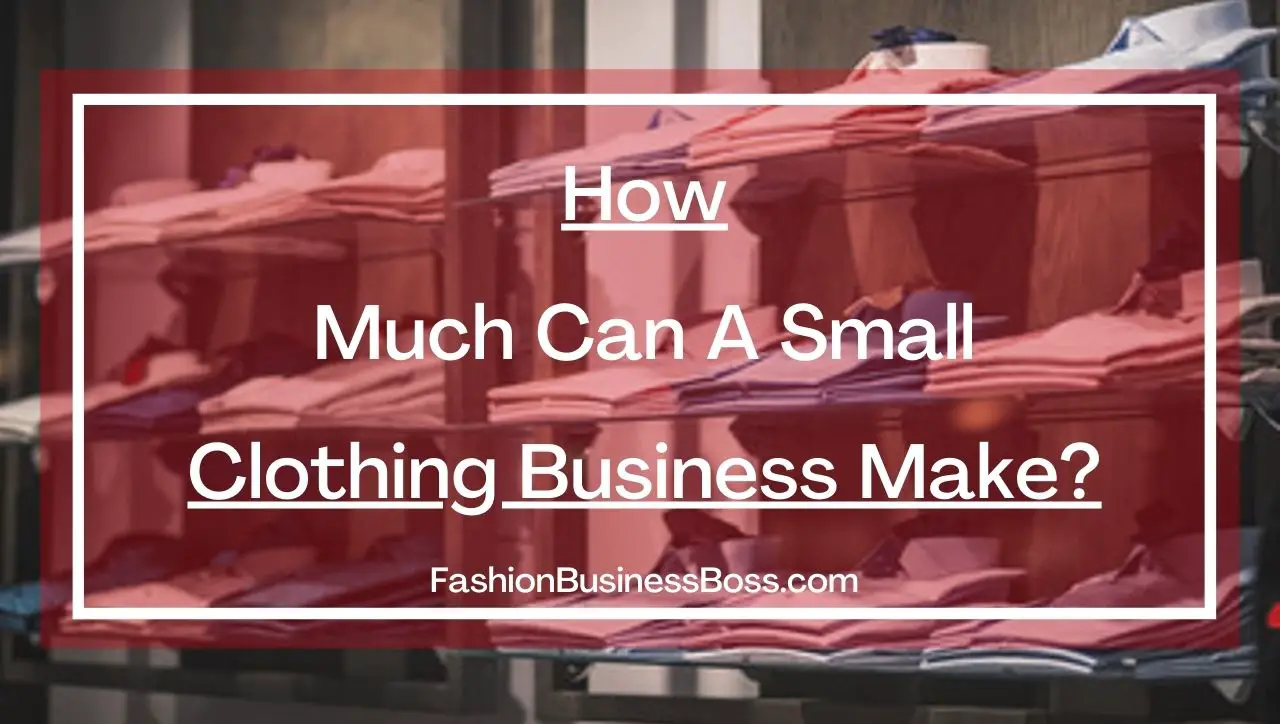To start a clothing business, you’ll need some basic information. This article will teach you how much money you can make with a small clothing business and the costs.
Before you start a clothing business, it’s important to know how much money you can make from it. You might want to start a clothing business to earn extra money for yourself or your family. Or perhaps you want to turn your passion for fashion into a profitable business venture.
The good news is that there are many ways to make money with clothing, including selling online and at trade fairs or markets.
Determining how much a small clothing business makes depends on the clothing niche you’re selling in (i.e., wedding dresses), costs associated with your manufacturer or wholesaler, finances/budget in your business plan, costs of licenses or trademarks, and how you choose to fund your business.
What’s your niche?

One of the most important things to consider when starting a clothing business is your niche. Your niche is the small area where you excel and are best known for. It’s not just about what you sell, but who buys it and why they buy it from you. For example, if you’re into vintage clothing, chances are that people who like vintage clothes will be interested in buying from you.
It would help if you also considered how much money people spend on clothing every year and how much they would be willing to pay for something similar to what you’re offering them. You can find this information by doing some research online at sites such as Statista.
Clothing niches that are profitable and how much they make:
- Lingerie: $91k annually
- Swimwear: $16 billion annually
- Activewear: $76k annually
- Men’s clothing: $52k annually
- Women’s clothing: $52k annually
- Children’s clothing: $159k annually
Costs of a manufacturer or wholesaler
Running a business can be costly. You must pay for design and manufacturing costs, marketing and sales expenses, warehousing fees, and shipping expenses. In addition to those things that cost money up front (e.g., purchasing materials), other recurring costs come out of your pocket every month or year: utilities like electricity; labor like salaries; insurance against theft; taxes on profits; accounting services (if not provided by an accountant); and more! Accountants and lawyers are also essential if you want to avoid legal trouble in the future.

You’ll have to pay for all of these things, but there are ways to reduce the costs. You can get discounts by ordering large quantities or buying bulk from manufacturers and wholesalers. Furthermore, you can also negotiate with suppliers—the people or companies who make your products—to lower their prices or offer them better terms (e.g., faster payment).
If you have a small business, you will likely be the only employee. You will also likely be your accountant and lawyer. Even if you hire an accountant, they will still charge you for their services and expertise.
Make a business plan
Writing a business plan is an important first step in starting your own clothing business. A well-written business plan will help you to achieve these goals:
- Determine the goals of your company and how you will achieve them.
- Create strategies that will help you stay focused on your goals.
- Make decisions based on data rather than emotion or opinion. For example, suppose you’re considering whether or not to open another location for your store. In that case, a good business plan should contain information about the costs involved and what kind of return on investment this would likely bring for it to make sense for your company as a whole.
- Keep track of progress so that there aren’t any big surprises down the line. When things get tough, concrete evidence about where things are going wrong can help keep morale high among your staff members by showing them that everyone’s working together to solve problems instead of complaining constantly!
- Determine finances and budget. The financial aspect of your business plan is an important one. You might want to consult with a financial advisor if this isn’t something you’re familiar with! You need to know how much money you’ll need to start and keep the store open and how much profit will increase over time.
5 Ways To Promote Your Clothing Store (Boutique)
Licenses and Trademarks
- Business licenses.
All businesses must register with their state and local governments, which requires a business license. In most states, you can apply for one online or in person at your town hall or county courthouse. Business licenses are generally valid for one year but may need to be renewed annually.
- Certificates of incorporation.
This document details the initial legal formation of a company as an official entity under state law, which allows it to conduct business independently from its owners (though it still legally owns any assets). Most small businesses don’t require this step until they become larger or want to raise capital from investors. However, if you anticipate that someday you might want to expand into other areas—or if you’re just curious—you should consider incorporating early on so that you don’t have to do it later when things get tough financially!
- Trademarks.

A trademark is a symbol, word, or phrase that identifies your brand and distinguishes it from the competition. It can be any shape or size but must be unique to protect your business against infringement. Trademarks are used in advertising, packaging, and promotional materials such as brochures and flyers. Registering with the US Patent and Trademark Office (USPTO) is the best way to get started with trademarks.
- DBA.
A DBA, or “doing business as,” is a form of business name registration that allows you to conduct your business under a different name than the one on your personal driver’s license. This is useful if you want to do business as something other than your name. Still, it can protect against copyright infringement and other legal issues related to brand ownership.
How To Grow Your Clothing Brand On Instagram
Fund your business
Once you’ve registered your business, you need to make sure that it has the money to keep going. You can do this by setting up a separate bank account for your business and making deposits into it regularly or by using an existing personal account and transferring money out of it as needed.
- How much money do you need to start a clothing business?
If you’re starting, there’s no need to spend thousands of dollars on high-end clothing before your first sale. Instead, invest in some basic items like t-shirts and hoodies to give away as samples or even sell at shows. If you have the funds available (and if it’s legal where you live), consider using a preorder website like Kickstarter or Indiegogo to help fund your initial inventory.
This will allow people who are interested in buying from your brand early on but aren’t ready for large purchases yet. If successful, this could lead them to become repeat customers later down the line when they’re ready for bigger orders!
- How much money do I need once my company takes off?
As soon as sales start coming in, think about how much money is needed to grow the business at its current rate—and then double it! Clothes are expensive, especially if made with high-quality materials like fabric imported from overseas countries such as Japan and China.
So plan accordingly when deciding how many new items should be included within each collection cycle (that’s every six months). It may seem counterintuitive because “more” isn’t always better; however, having too little inventory leads to losing profit and negatively affects customer satisfaction levels, which leads directly back to lost profits.
- Should you set money aside for taxes?

As a small business owner, you’re responsible for paying taxes on your income. It’s important to plan and set aside money in your budget to pay the taxes owed when they are due (estimated taxes). If you don’t pay enough in estimated taxes, the IRS will issue penalties that will be taken from any refunds or credits you have coming back to you.
There are many different things you can do as a small clothing business. If you want to make the most out of it, then you must have an idea of what direction your brand will take before starting. This will help keep costs down while ensuring everything is done correctly and within legal limits.
10 Tips On How To Promote Your Fashion Clothing Business
Related Questions
Is a small clothing business profitable?
A small clothing business can be profitable if you know how to market to your target audience. Research what types of clothing sell best in your area first and then progress from there.
Which clothing business is most profitable?
Many people need alterations since clothes aren’t perfect. Alteration businesses and clothing boutiques are among the most profitable clothing businesses. Costumes and children’s clothes are also among the most profitable. Costumes can be used year-round.
What are the threats in the clothing business?
Threats in the clothing business include the cost of materials, labor costs, and constant copying of designers. Materials are expensive, as well as hiring employees or contractors to make the clothes.
To learn more about how to start your own fashion clothing line check out my startup documents here
Please note: This blog post is for educational purposes only and does not constitute legal advice. Please consult a legal expert to address your specific needs.

Meet Shawn Chun: Entrepreneur and Fashion Business Fan.
I’m a happy individual who happens to be an entrepreneur. I have owned several types of businesses in my life from a coffee shop to an import and export business to an online review business plus a few more and now I create online resources for those interested in starting new ventures. It’s demanding work but I love it. I do it for those passionate about their business and their goals. That’s why when I meet a designer or boutique owner at a craft fair, farmers market, retail location or anywhere else I see myself. I know how hard the struggle is to retain clients, find good employees and keep the business growing all while trying to stay competitive.
That’s why I created Fashion Business Boss: I want to help fashion business owners like you build a thriving business that brings you endless joy and supports your ideal lifestyle.

